Introduction
Navigating London's dynamic business landscape requires robust and reliable IT services tailored to diverse sector needs. London's IT service offerings encompass managed IT services, cloud computing solutions, cybersecurity measures, data analytics, and IT consultancy. Managed IT services ensure optimal performance and minimal downtime through proactive support, covering everything from network management to data backup.
Cloud computing solutions enhance operational agility and flexibility, crucial for sectors like finance that rely on hybrid clouds for uninterrupted services and robust data security. Cybersecurity remains paramount, safeguarding sensitive information and maintaining client trust, especially within the financial sector. Data analytics empower businesses with real-time insights for informed decision-making and strategic planning.
The European IT services industry has experienced significant growth, with revenues reaching $389.3 billion in 2022, driven by the demand for operational resilience and digital transformation investments. The infrastructure services segment, reflecting the critical importance of robust IT infrastructure, holds the largest market share. Technological advancements such as 5G connectivity and AI further revolutionize data centers, bolstering efficiency and reducing human error.
The rising demand for hyperscale data centers, driven by the need for scalable digital services and governmental initiatives to enhance the digital economy, underscores the vital role of advanced IT services. By leveraging these services, businesses in London can enhance operational efficiency and remain competitive in the rapidly evolving digital landscape.
Key Offerings of IT Services in London
"London's IT offerings provide a comprehensive range of solutions tailored to meet the diverse needs of companies across various sectors.". Key offerings include managed IT support, cloud computing solutions, cybersecurity measures, data analytics, and IT consultancy. Managed IT solutions offer proactive assistance, ensuring optimal performance and reducing downtime. This encompasses everything from basic network and server management to advanced data backup and infrastructure oversight. Cloud computing solutions enable organizations to utilize scalable resources, enhancing flexibility and operational agility. This is especially advantageous for sectors such as finance, where hybrid clouds are becoming essential for continuous operations and data security.
Cybersecurity is paramount in protecting sensitive information, with advanced measures in place to counter evolving threats. London’s financial sector, for instance, relies heavily on robust cybersecurity to safeguard assets and maintain client trust. Data analytics plays a crucial role in empowering businesses with real-time insights, facilitating informed decision-making and strategic planning.
'The European IT sector has shown remarkable expansion, with total earnings hitting $389.3 billion in 2022, fueled by heightened demands for operational resilience and investments in digital transformation.'. Significantly, the infrastructure sector represented the largest market share, highlighting the essential role of strong IT infrastructure in the current digital economy.
Advancements in technologies such as 5G connectivity and AI are further revolutionizing data centers, boosting efficiency and reducing human error. As Richard Wellbrock, Chief Commercial Officer at Colt DCS, points out, the demand for hyperscale data centers is increasing, fueled by the need for scalable digital solutions and the UK Government's initiatives to boost the digital economy.
By utilizing these advanced information technology solutions, organizations in London can not only improve their operational effectiveness but also remain competitive in a swiftly changing digital environment.
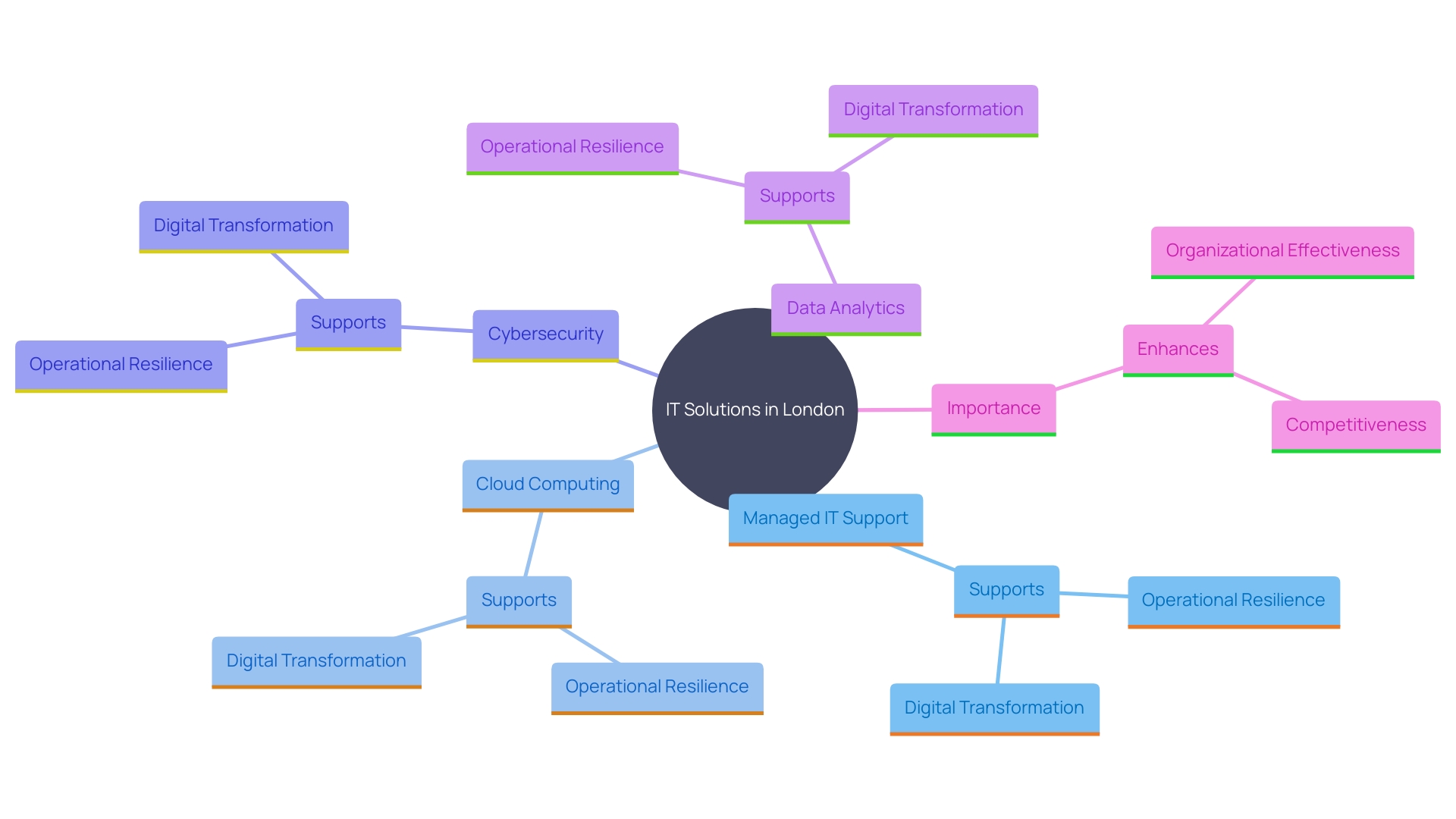
Benefits of IT Support for Businesses
Establishing strong IT assistance can transform a business's operational effectiveness and output. By promptly addressing technical problems, IT assistance greatly minimizes downtime, enabling employees to concentrate on their primary duties. This is evident in cases like Delivery Hero, where the IT service delivery team successfully minimized delays by resolving account lockouts, thus improving efficiency. Additionally, IT assistance enables access to the latest technological advancements and best practices, ensuring businesses remain competitive in a rapidly evolving market.
The collaboration between a company and Unisys, for instance, exemplifies how adopting a Device Subscription Service (DSS) can streamline operations and reduce costs by optimizing the use of endpoint devices. This not only improves employee efficiency but also aligns with sustainability goals by managing hardware performance effectively. Furthermore, the proactive strategy for digital workplace solutions, as illustrated by the company's EX program with Unisys, emphasizes the significance of incorporating next-gen assistance to enhance employee satisfaction and productivity across a global user base.
Such initiatives underscore the deep trust in technology and the IT organization, as noted by Forrester's study. By adapting technology capabilities to meet the dynamic needs of enterprises, firms can achieve higher customer satisfaction and faster growth. 'Embracing IT assistance as a strategic investment can lead to transformative results, making it a cornerstone for long-term business success.'.
Types of IT Support Services
Organizations have different IT assistance options to select from, customized to their particular requirements. 'These services encompass remote assistance, on-site aid, and helpdesk services, each providing distinctive advantages to improve operational efficiency and problem resolution.'.
Remote assistance enables IT experts to help clients from afar, offering swift and effective problem resolution. This type of assistance is invaluable for businesses with remote workers or globally dispersed teams. As noted by experts, remote assistance software is crucial for IT teams, enabling them to remotely access and control devices for troubleshooting and maintenance, thereby saving time and money.
On-site support provides hands-on assistance for complex problems that require physical intervention. 'This support is essential when issues cannot be resolved remotely, ensuring that technical challenges are addressed promptly and effectively.'. For instance, real-time troubleshooting capabilities have significantly improved problem resolution times for organizations managing extensive device networks.
Helpdesk support functions as a primary point of contact for users seeking assistance, offering troubleshooting and guidance for a wide range of IT-related issues. 'These offerings are essential for sustaining seamless operations, as they assist in quickly addressing and resolving user issues.'. By leveraging tools and systems tailored to their needs, organizations can create processes that are both repeatable and scalable, enhancing overall efficiency.
In summary, the correct blend of IT assistance can lead to notable enhancements in customer experience, risk reduction, and operational efficiency, ultimately contributing to company growth and success.
Advantages of Outsourcing IT Support
Outsourcing IT assistance offers numerous advantages to companies looking to optimize their operations. By collaborating with external IT support providers, organizations can significantly cut costs linked to hiring in-house IT personnel and managing IT infrastructure. This partnership grants access to a wealth of expertise and resources, enabling companies to leverage specialized knowledge without the associated overhead. For instance, Delivery Hero, the leading local delivery platform, faced challenges with employees getting locked out of their accounts. By outsourcing some IT processes, they managed to reduce downtime and allow their employees to focus on their primary tasks.
Furthermore, outsourcing IT support brings adaptability, enabling companies to adjust offerings up or down according to changing workloads. This adaptability ensures that companies can efficiently manage their resources, especially during peak times or when scaling operations. Specialized providers bring advanced tools and technologies, ensuring tasks are performed with higher efficiency and quality. For instance, the Indian IT industry, which has expanded to represent 45% of the nation's total exports, illustrates how outsourcing can enhance efficiency and quality through economies of scale.
Furthermore, outsourcing enables organizations to focus on essential functions. By delegating non-core tasks to external experts, management can focus on strategic planning and innovation. This method not only conserves time and effort but also reduces specific risks, such as project delays or cost overruns, as providers often take on these responsibilities. As observed in the success of global companies like IBM and Cognizant, outsourcing can lead to optimized returns and increased operational efficiency.
'Ultimately, outsourcing IT assistance ensures that businesses remain agile, competitive, and focused on their strategic objectives, while benefiting from the expertise and advanced capabilities of their service providers.'. This strategic move can drive growth, enhance productivity, and enable companies to stay ahead in today’s rapidly evolving technological landscape.
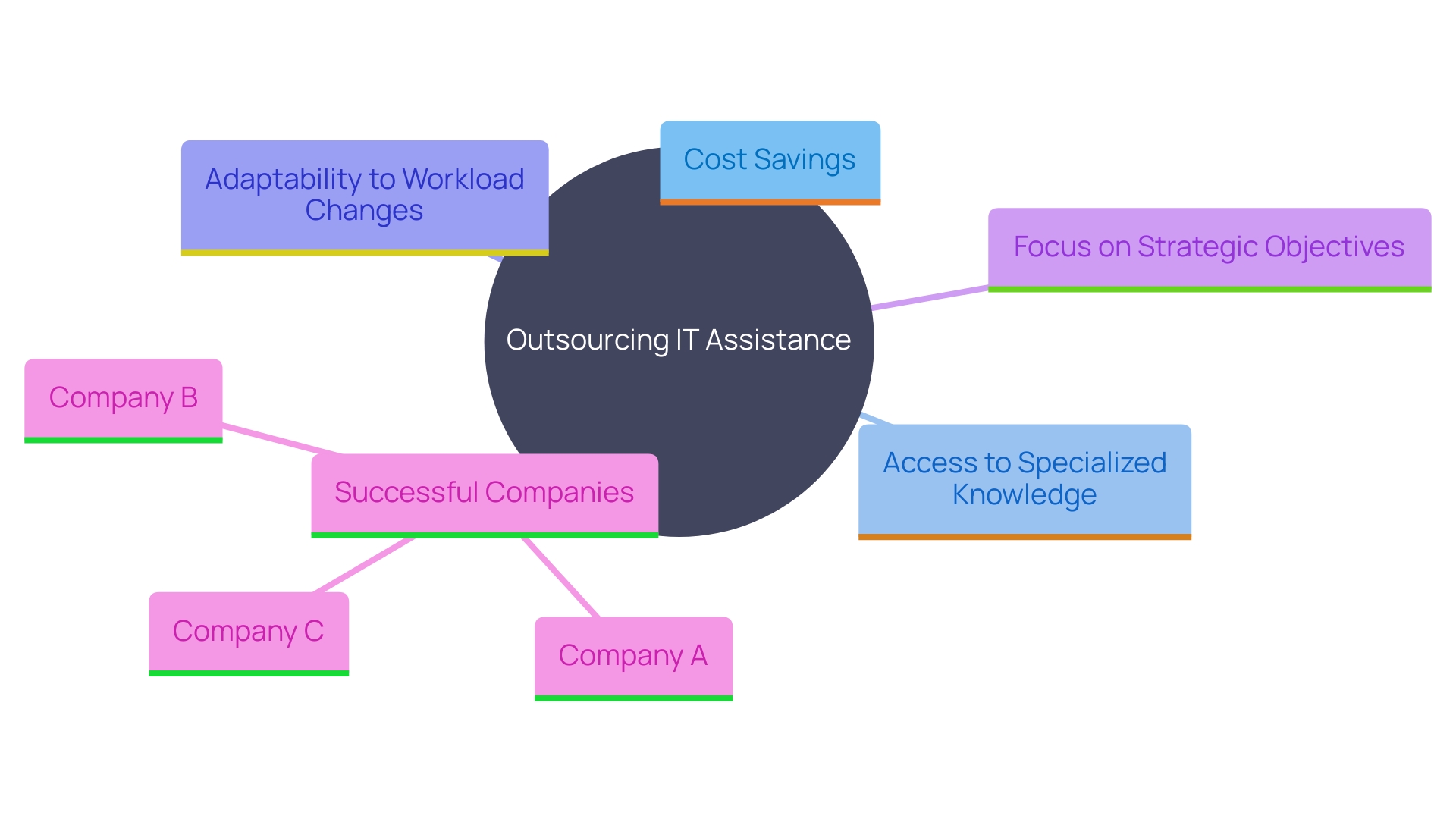
The Role of IT Support in Enhancing Security
IT assistance is pivotal in fortifying an organization's security landscape. Given the surge in cyber threats, dedicated IT assistance ensures the effective implementation and monitoring of security protocols. For instance, when Abhilash Rajan joined New America, he identified significant gaps in their password management system, which was previously reliant on Google Sheets. Addressing such vulnerabilities, IT professionals regularly conduct security assessments, implement necessary updates, and educate employees on best practices to mitigate risks.
This proactive stance not only safeguards sensitive information but also fosters trust among customers and stakeholders. A notable example is FoodCorps, where insufficient IT assistance jeopardized critical grant application timelines. By adopting a robust IT solution, they ensured seamless operations and secured their funding and mission. According to ISACA, 66% of cybersecurity experts indicate their positions are more demanding now than five years ago, highlighting the need for strong IT assistance.
Moreover, 54% of organizations experienced some form of cyber attack last year, with ransomware being the most disruptive, affecting 37% of businesses. Yet, 82% of organizations express confidence in their ability to respond effectively, thanks to increased cybersecurity budgets. In essence, effective IT assistance not only enhances security but also reinforces an organization’s reputation and operational resilience.
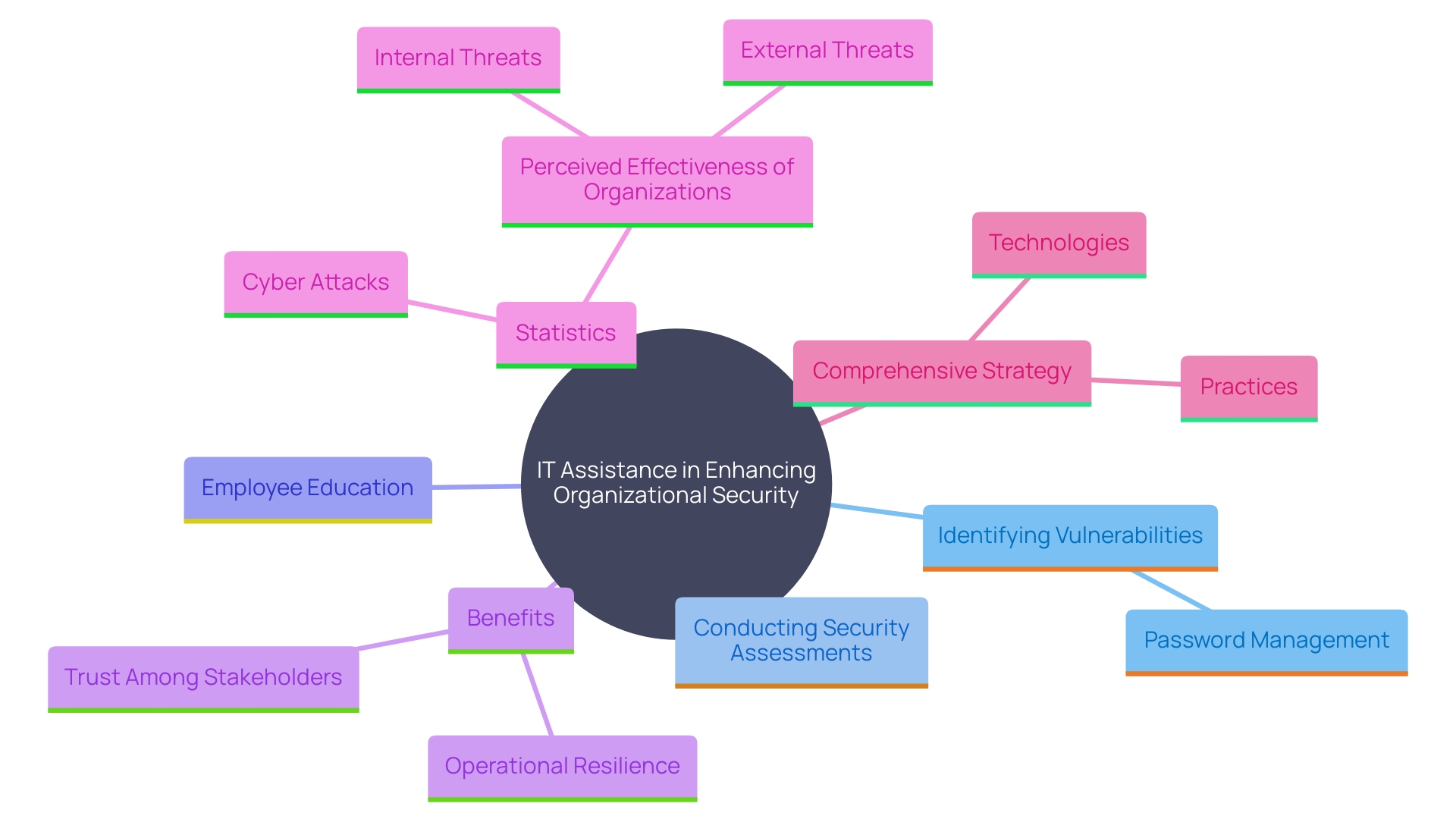
Impact of IT Support on Productivity and Efficiency
Efficient IT assistance plays a crucial role in improving output and operational effectiveness within a company. By resolving technical issues promptly, IT support minimizes disruptions that can impede workflow. For instance, Delivery Hero, active in over 70 nations with over 53,000 staff members, encountered considerable efficiency losses due to account lockouts. Their IT team managed to reduce recovery times, thereby enabling employees to return to their tasks more swiftly.
Streamlined IT processes and systems are equally vital. At California State University, adopting structured tools like Postman has eliminated repetitive steps, fostering a more efficient work environment. 'This approach not only saves time but also enhances collaboration among teams, ultimately accelerating project progress and improving overall efficiency.'.
Statistics suggest that efficiency in the U.S. has increased at a modest 1.4% rate from 2005 to 2023, emphasizing the significance of effective IT assistance in promoting higher output levels. Furthermore, businesses that utilize various collaboration tools indicate greater efficiency, showcasing the beneficial effect of effectively executed IT systems on organizational performance.
Furthermore, a case study featuring Unisys showcases the advantages of next-generation IT assistance. By providing comprehensive digital workplace solutions to over 100,000 users globally, Unisys has significantly improved employee satisfaction and productivity. This illustrates how advanced IT assistance can transform workplace dynamics, contributing to the overall success and profitability of the business.
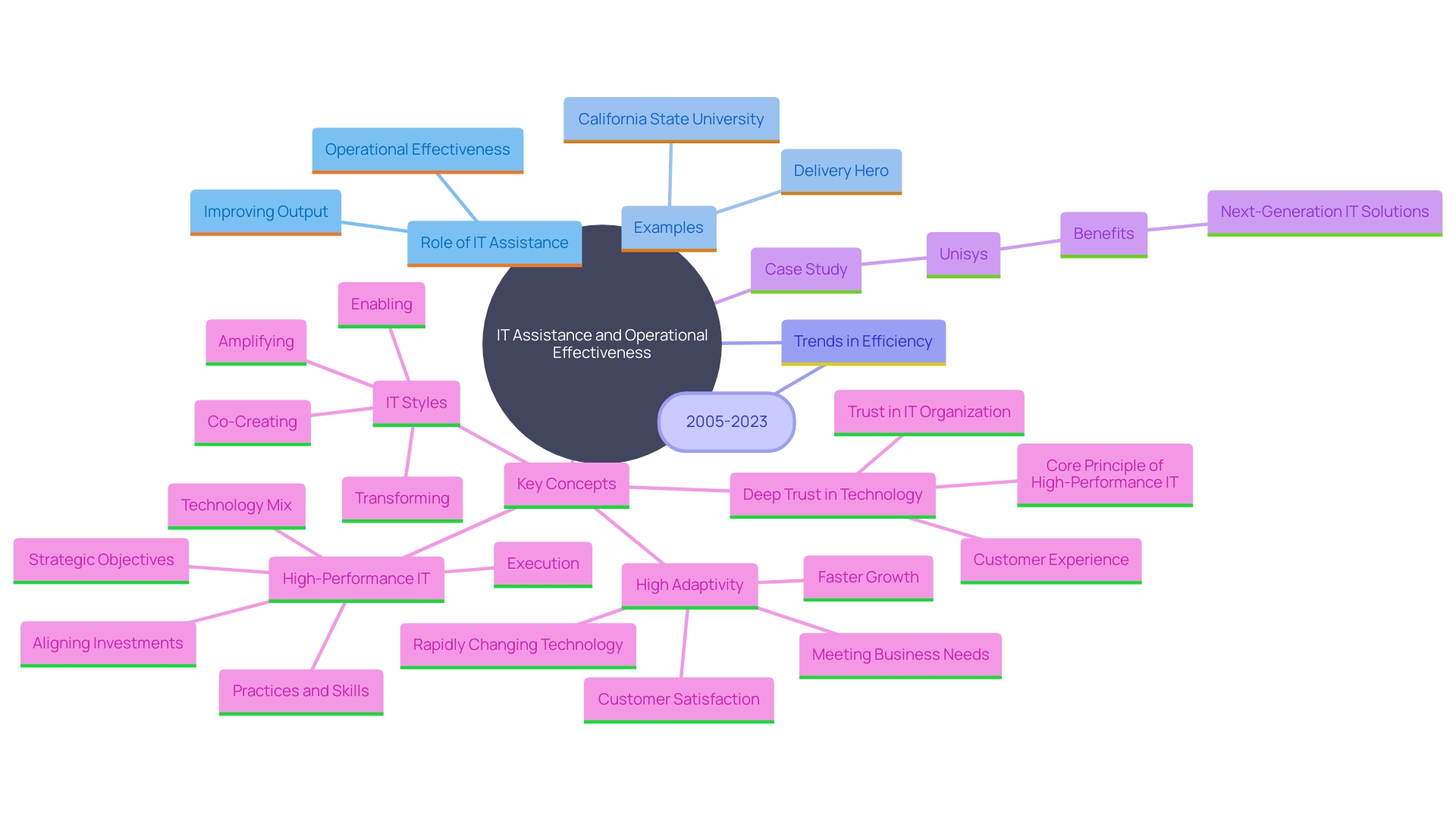
Scalability and Flexibility of IT Support Services
One of the key benefits of contemporary IT assistance is their scalability and adaptability. Businesses can seamlessly adjust their IT assistance needs in line with growth and evolving requirements, ensuring they remain agile in a dynamic market. This adaptability allows organizations to respond swiftly to market changes or technological advancements without hefty upfront investments. For instance, Delivery Hero, operating in over 70 countries with 53,000 employees, faced significant challenges with account lockouts, averaging 800 recovery requests per month. By enhancing their IT assistance services, they minimized downtime and improved productivity, showcasing the impact of scalable IT solutions. Similarly, TBC Bank's agile transformation aimed to reduce organizational complexity, enabling smoother transitions and growth. Scalable IT support ensures organizations can access necessary resources and expertise as demands increase, facilitating smooth transitions during periods of expansion. This approach aligns with the strategic IT consulting that provides guidance for long-term IT planning, optimizing operations, and reducing costs. As noted by industry leaders, firms that adapt their technology capabilities to meet changing business needs experience higher customer satisfaction and faster growth. This is supported by statistics showing the European IT services industry's robust growth, with total revenues reaching $389.3 billion in 2022, driven by the need for operational resilience and digital transformation.
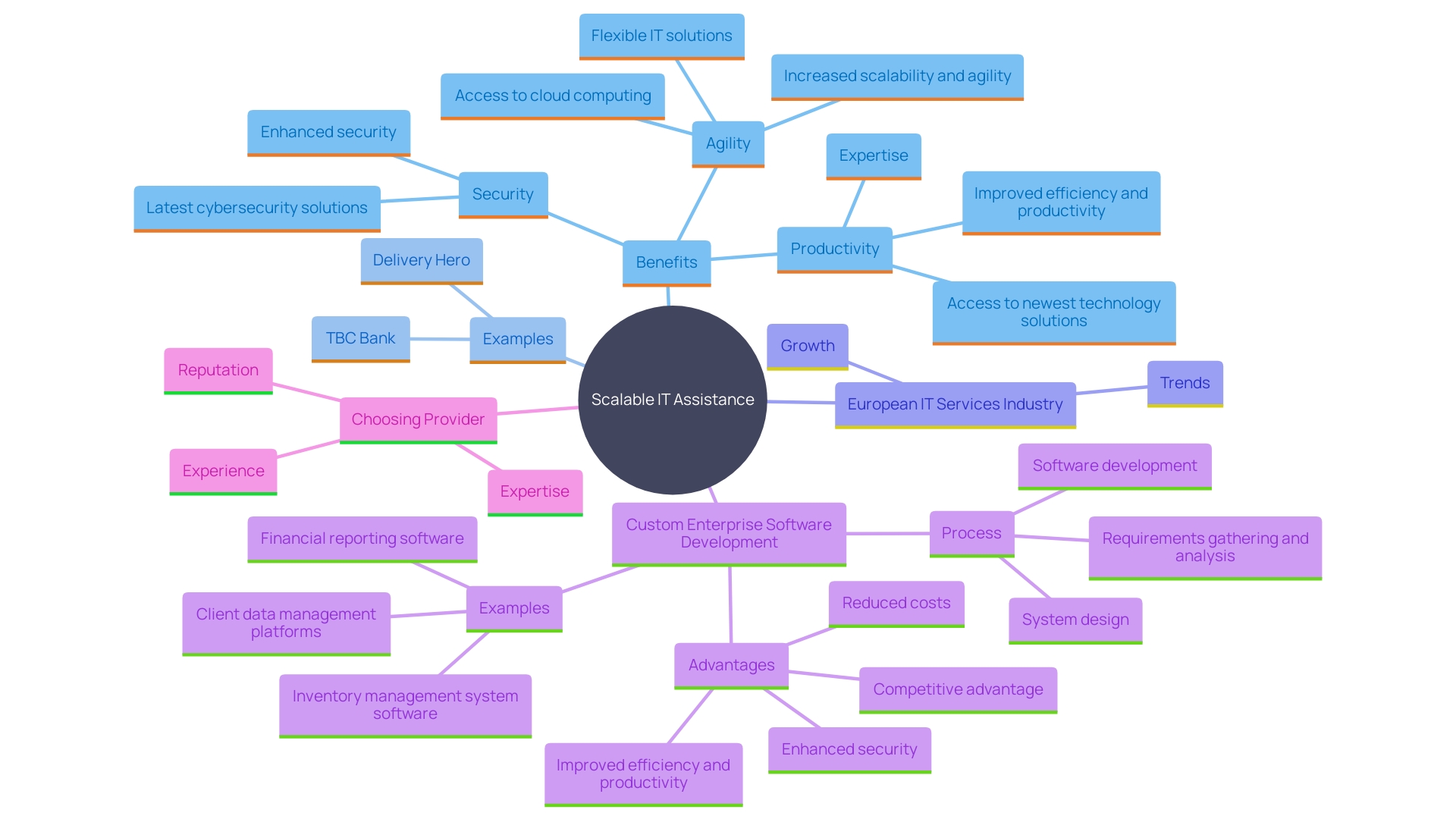
Conclusion
London's IT services landscape presents a diverse array of offerings that cater to the multifaceted needs of businesses across various sectors. Managed IT services, cloud computing solutions, cybersecurity measures, data analytics, and IT consultancy are pivotal components of this framework. These services not only enhance operational efficiency but also ensure businesses remain competitive in an increasingly digital economy.
The integration of advanced technologies, such as 5G and AI, further amplifies the potential for organizations to optimize their IT infrastructure and processes.
The advantages of robust IT support cannot be overstated. By minimizing downtime and swiftly addressing technical issues, IT support enhances productivity, allowing companies to focus on core business functions. Outsourcing IT support emerges as a strategic move, granting organizations access to specialized expertise while reducing costs associated with in-house resources.
This flexibility and scalability empower businesses to adapt to changing demands, ensuring they are equipped to thrive in a competitive landscape.
Moreover, the emphasis on cybersecurity is crucial in safeguarding sensitive information and maintaining stakeholder trust. With an increasing number of cyber threats, dedicated IT support plays a vital role in implementing effective security protocols and fostering a culture of awareness among employees. By investing in comprehensive IT support, organizations not only enhance their operational resilience but also reinforce their reputation within the market.
In summary, embracing advanced IT services and support is essential for businesses aiming to navigate the complexities of the modern digital environment. By leveraging these resources, organizations can achieve significant improvements in productivity, efficiency, and security, positioning themselves for sustained growth and success in an ever-evolving landscape.




